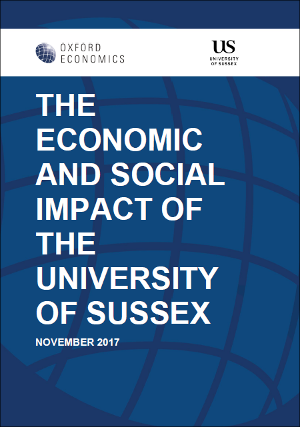Ungated Post | 05 Apr 2018
The Economic and Social Impact of the University of Sussex

The University of Sussex contributes £343 million to the annual GDP of Brighton and Hove, plus East and West Sussex. Together with its students and visitors, the university supports a total of 5,180 jobs across the region. This report outlines how this economic impact is generated by all elements of the university, before exploring the benefits it delivers to both local and national economies––and society as a whole.
One of the region’s leading employers, the University of Sussex directly employs some 2,390 staff, 87 percent of whom live in the local area. Together with its students and visitors, the University sustains £74.9 million in annual tax revenues, enough to pay the running costs for the East Sussex Fire Authority for almost two years.
But the University’s value extends far beyond its core economic impact. Each year it produces thousands of talented graduates, more than 5,000 in 2016, many of whom go on to work locally and in “socially significant” roles as teachers, social workers and doctors. A notable proportion of the University’s graduates working local do so in professional occupations, including those working in science, research and engineering.
The university also plays a leading role in cutting-edge research. In 2015/16, it attracted £35.6 million in funding for R&D activities that deliver long-term benefits for society at large. Using our input-based model of research impact, we found the future benefits of this research to deliver social and private benefits reaching £154 million gross value added.
Oxford Economics’ team is expert at applying advanced economic tools that provide valuable insights into today’s most pressing business, financial, and policy issues.
To find out more about our capabilities, contact:
Americas
Diantha Redd
+1 (646) 503 3052
Email
Asia Pacific
Peter Suomi
+65 6850 0110
Email
EMEA
Aoife Pearson
+44 (0)203 910 8054
Email
Related Services

Post
The economic impact of abandoning the WTO
Oxford Economics have been commissioned by the International Chamber of Commerce (ICC) to provide an independent assessment of the economic impact of WTO dissolution. This report details our findings and the assumptions underpinning our analysis.
Find Out More
Post
The economic impact of the sports activities of public service media
This study shows how the sports activities of public service media supported €4.5 billion of GDP and 57,000 jobs across 31 European countries in 2022. The report also highlights wider economic benefits of public service media sports coverage, such as the way in which it leverages sponsorship income for sports bodies.
Find Out More
Post
Global Trade Education: The role of private philanthropy
Global trade can amplify economic development and poverty alleviation. Capable leaders are required to put in place enabling conditions for trade, but currently these skills are underprovided in developing countries. For philanthropists, investing in trade leadership talent through graduate-level scholarships is an opportunity to make meaningful contributions that can multiply and sustain global economic development.
Find Out More